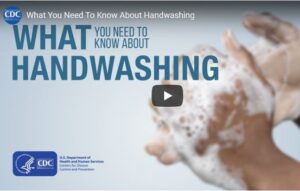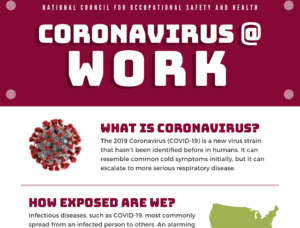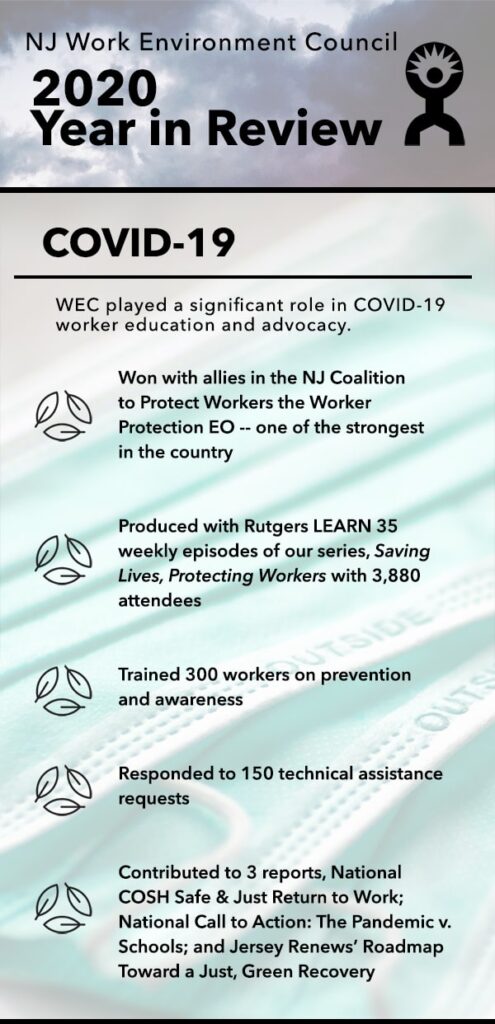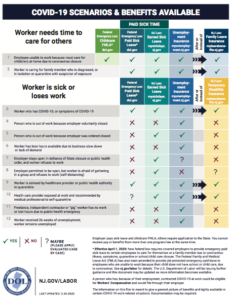COVID-19 Resources
What is COVID-19?
The most recent coronavirus, COVID-19, is a new strain of virus that hasn’t been identified before in humans. The COVID-19 virus is a respiratory pathogen that is highly contagious, and it is far more lethal than the flu virus.
Some symptoms of coronavirus include – fever, cough, body aches and tiredness and they can worsen and cause pneumonia, fluid in the lungs that leads to shortness of breath. The COVID-19 illness is more severe than the flu, and the chance of dying from it is greater than the seasonal flu, estimates up to 30x greater risk of death. COVID-19 has been able to spread from person to person very easily and requires an immediate response to protect workers and the general public.
The best way to prevent illness is to avoid being exposed to this virus. Some recent studies have suggested that COVID-19 may be spread by people who are not showing symptoms. The virus is thought to spread mainly from person-to-person, between people who are in close contact with one another (within about 6 feet), through respiratory droplets produced when an infected person coughs, sneezes or talks because these droplets can land in the mouths or noses of people who are nearby or possibly be inhaled into the lungs.
Protect Yourself!
Steps to Take to Protect Yourself
Below are some steps you can take to protect yourself at work or in your daily life. This is not a comprehensive list. It is important to note, as more is learned about COVID-19, the Center for Disease Control and Prevention (CDC) continues to update their guidance on how to protect yourself. For the most recent updates, visit the CDC website.
- Wear a mask to protect yourself and others and stop the spread of COVID-19. Wear your mask over your nose and mouth and secure it under your chin. Fit the mask snugly against the sides of your face, slipping the loops over your ears or tying the strings behind your head.
- Stay at least 6 feet (about 2 arm lengths) from others who don’t live with you.
- Avoid crowds. The more people you are in contact with, the more likely you are to be exposed to COVID-19.
- Avoid poorly ventilated spaces.
- Wash your hands often. If soap and water are not readily available, use a hand sanitizer that contains at least 60% alcohol.
- Monitor health daily.
- Get Vaccinated to Protect Against COVID-19
- Clean and disinfect objects and surfaces you touch often. Use cleaning products as directed.
Employers should follow the MOST protective guidance and standards issued by state or federal agencies. If guidance contradicts each other, the MOST protective should be implemented.
COVID-19 Weekly Updates: Saving Lives, Protecting Workers
In this weekly series, we will hear from and talk with public health experts, government officials, medical personnel, front-line workers and worker representatives about the latest developments in the fight against COVID-19. The series is sponsored by WEC, Rutgers Learn and Jersey Renews and airs on Tuesday @ 12pm. Want to receive weekly series emails, sign up here.
Past Webinar Summaries
June 9: COVID, Social Distancing, and the Economy: What Can We Learn from the Swedish Experience
This week we were joined by Professor Aman Russom, head of the bionanotechnology division at the KTH Royal Institute of Technology in Stockholm, who works on the development and delivery of low-cost medical testing and technology for public health. Since March, Sweden has been functioning more or less the way New Jersey will function when it reopens.
Unlike the United States, Sweden never applied a total lockdown during COVID-19. Instead, relying heavily on voluntary stay at home protocols, hand-washing and recommended social distancing, Sweden focused on asking those who had even mild symptoms to stay at home and provided immediate income support to enable workers to […]
June 2: The Impact of School Closings & The Challenges of Reopening
This week we were joined by 292 participants for an update which focused on K-12 schools. We discussed the impact of shutting schools down on teachers, staff, parents and students and the challenges of reopening our schools.
We were joined by Cary Booker, Assistant State Education Commissioner, State of New Jersey who acknowledged the sacrifices of educators and their families to meet the needs of their students. Assistant Commissioner Booker spoke to the inequities that plagued our education system long before COVID-19, their effect on remote instruction and food instability, and the state’s efforts to address them. As we look to reopen, Assistant Commissioner Booker […]
May 26: Public Sector Employee Safety and Health in the Age of Covid
This week we heard from Jerome Johnson, General Chairman of Sheet Metal, Air, Rail, and Transport (SMART) Local 60 (United Transportation Union [UTU]) who gave an update about conditions on NJ Transit trains and buses. The transportation sector will be the exclusive focus of an update in the near future.
PEOSH (DOH and DLWD) also joined the call with a report on their activities. During the first 11 weeks of the emergency, the agency has received approximately 60 COVID-19 related complaints. During the emergency, it is not conducting onsite investigations. Instead, it relies on initial virtual investigations over the phone, with onsite followup visits […]
May 19: Workers’ Rights, Worker Safety and Workplace Justice
This week we were joined by more than 165 participants, who heard from Marcy Goldstien-Gelb, Co-Director of National COSH and Nancy Lessin, retired United Steelworker and COSH fellow on the Safe and Just Return to Work report; a blueprint for opening the economy with worker protections and worker justice in the forefront.
We were also joined by Lou Kimmel, Executive Director, New Labor to discuss a proposed Executive Order: COVID-19 Worker Protections that would implement a meaningful and enforceable right to refuse work in violation of mandated pandemic protections now before Governor Murphy.
May 12: Working Safer in Unsafe Times: What’s Happening in the Construction Industry and at Distribution Centers
This week, WEC welcomed a panel of guests who are organizing and representing workers deemed essential during the COVID-19 crisis. Anthony Abrantes, Organizing & Political Director for the Eastern Atlantic States Regional Council of Carpenters; Christian Smalls, an organizer and Former Warehouse Assistant Manager at Amazon; and to welcome back Dave Hancock, Warehouse Campaign Director with the Laundry, Distribution and Food Service Joint Board, Workers United, SEIU.
Anthony Abrantes, Organizing & Political Director for the Eastern Atlantic States Regional Council of Carpenters, spoke to the importance of health and safety measures for their members, steps the union has taken to ensure their safety, and what a just […]
The COVID-19 webinar series is sponsored by



Benefits for Workers
NJ Department of Labor and Workforce Development Resources
- What NJ Workers Need to Know about the Families First Coronavirus Response Act Factsheet
- NJ Division of Unemployment: https://myunemployment.nj.gov/
- Guidance for Self-Employed Individuals Filing a Pandemic Unemployment Assistance Claim and FAQs
- NJ Family leave Insurance: https://myleavebenefits.nj.gov/labor/myleavebenefits/worker/fli/index.shtml
- NJ Earned Paid Sick Leave: https://www.nj.gov/labor/worker-protections/earnedsick/law.shtml
- NJ Temporary Disability Insurance: https://myleavebenefits.nj.gov/labor/myleavebenefits/worker/tdi/index.shtml
Federal Paid Sick Leave and CARES act expansions and stimulus
- US Department of Labor: Families First Coronavirus Response Act: Employee Paid Leave Rights



